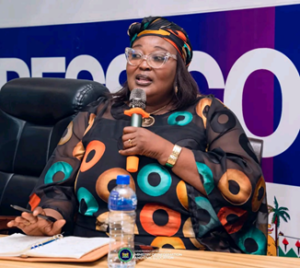By Kadiatu Sankoh
Freetown, Sierra Leone,
On 25 July 2025, the Freetown City Council (FCC) announced a bold and comprehensive Central Business District (CBD) Regeneration and Beautification Project aimed at restoring order, improving sanitation, and enhancing the overall aesthetic appeal of Sierra Leone’s capital city.
Speaking at a press conference hosted by the Minister of Information and Civic Education, Hon. Chernor Bah, at the Miatta Conference Center, FCC’s Information, Education, and Communication Officer, Madam Koma Hassan-Kamara, described the initiative as timely and aligned with both the city’s development aspirations and national priorities.

“This initiative is coming at the right time,” Madam Kamara remarked. “We’ve been advocating for support around beautification, regulated parking, and street trading control in the CBD for the past couple of years. Now that the central government is aligned with us, we believe we can make real progress.”
One of the Council’s early interventions involved decongesting the area around Cotton Tree, which had become increasingly unsafe due to clusters of informal traders and beggars. Madam Kamara highlighted that uncontrolled street trading, particularly in unauthorized zones, continues to be a serious challenge inherited by the current administration.
She also identified rural-urban migration as a key contributor to urban disorder. “Many people arrive in Freetown from the provinces looking for quick income and start trading or riding okadas (motorbike taxis) without regulation or designated areas,” she said. “That’s where a lot of our problems begin.”
With renewed support from the central government, the Council plans to strictly enforce designated trading zones in collaboration with the Traders’ Council and relevant agencies.
Beyond trading, the Council is taking steps to address the illegal dumping of building materials on public roads, a practice that severely disrupts pedestrian and vehicular movement. Under the new 2025 Sanitation Bylaw, regulations have been introduced to curb these practices and restore proper use of public space.
“We’ve had too many cases where sand and gravel are left on roads, blocking traffic and causing delays,” Madam Kamara noted. “This happens across the city—east, west, and central—and we’re committed to putting an end to it.”
At the heart of the FCC’s new plan is its flagship initiative, C2CC – Central to Clean and Control, which aims to bring back structure, safety, and beauty to the capital’s core.
Key features of the project include the installation of modern street lighting, regulated parking zones, restoration of green spaces, beautification, and the enforcement of sanitation and no-street-trading zones.
The project will be implemented in close coordination with the Sierra Leone Roads Authority (SLRA), the Sierra Leone Road Safety Authority (SLRSA), and other agencies.
“We don’t want to do this alone,” Kamara said. “We are partnering with national agencies to transform the CBD into a space that reflects discipline and civic pride.”
She stressed that the challenges of urban disorder and lawlessness are not limited to the CBD. “This is a city-wide issue,” she said. “Our mandate may be limited, but we continue to call for greater devolution of authority from the central government so we can manage the city more effectively.”
With the combined backing of national institutions and local stakeholders, the Freetown City Council is optimistic that the C2CC project will usher in a new era of urban transformation, making the city safer, cleaner, and more attractive to investors, tourists, and residents alike.
“Nobody wants to visit or invest in a city that is unsafe or unregulated,” Kamara concluded. “This project is about restoring discipline, creating beauty, and laying the foundation for sustainable urban growth.”